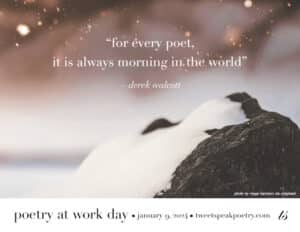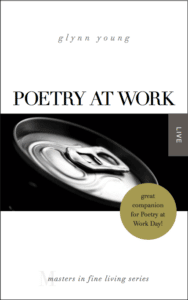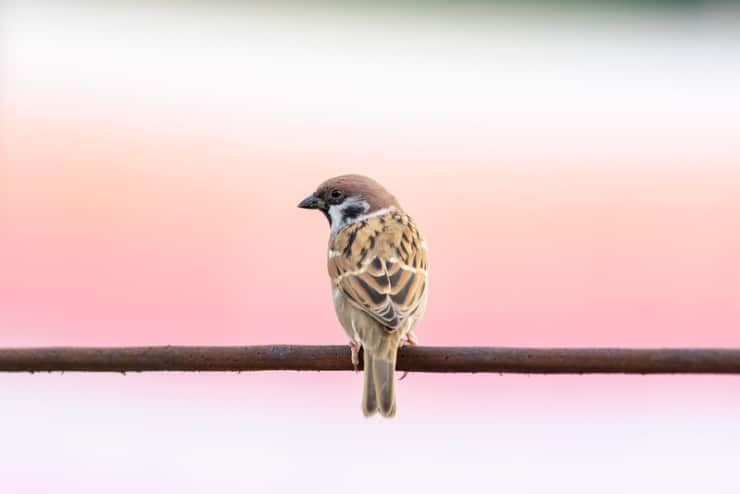Poetry can be found in our work, if we listen for it
I had lunch with a friend and former colleague last week. We hadn’t worked together since 2015, and I hadn’t seen her since 2018. But we were Facebook friends, and in the intervening years we’ve stayed aware of families and careers.
While we talked, I was reminded of a year in both of our lives, and the lives of some 23 other colleagues. From 2008 to 2009, the group of us were part of something not seen before and never seen again in our company: the almost overnight creation of a 25-person department focused on new technologies, straightforward communications with employees, and dealing in a new way with issues besetting the company (of which there were a multitude).
Many of the people in the new group were young, right out of college, in fact. Some were fully experienced. All were aware they were part of something unusual in the company, something that hadn’t been seen before, at least on this scale.

I soon discovered that speechwriters were given a leeway at work that few others enjoyed. You could read in the office without anyone thinking you were goofing off. And not just business and current issues books, but poetry and even fiction! (It helped to write for a CEO who was widely known for reading the works of Winston Churchill and Charles Dickens. His speechwriters were expected to read what he read. Poor me.)
After that experience, I went on to other kinds of work. But in 2008, in the newness and strangeness of this new organization I was a part of, the need to read, and write, poetry returned. And once I rediscovered poetry, I began to see and hear poetry everywhere. In dull, repetitive meetings. In emails and memos. In company announcements. In news articles. In my daily commute. Even in layoffs, retirements, vision statements, and PowerPoint presentations. To poeticize the well-known saying:
When you have
a new hammer,
the whole world
looks like
a nail.
Today is Poetry at Work Day 2024. For me, while I worked full-time, every day was Poetry at Work Day. Even if you don’t have a new hammer, though, it’s still a good thing to single out a day in a year to recognize and celebrate the poetry that is our daily work.

You don’t have to be obvious or public in your celebration. Consider writing a poem about your own work, something you do every day. Read a poem about work aloud; the Whitman poem in “10 great poems” noted above lends itself to being read aloud. Ask, and answer, a question: Where do you find poetry at work, and does it make a difference?
That great team I was part of lasted a little over a year. It was new, doing a new thing, and it was almost radically different from anything that had gone on before. I’m still surprised at what it accomplished in that short time. What happened? You might say that the forces of reactions and orthodoxy worked to control or stop it, and you wouldn’t be far wrong. Sometimes, poetry can be unsettling, or even frightening.
But as that luncheon conversation reminded me, it was a team that celebrated Poetry at Work every day, and it is remembered for the poetry it created.
Photo by llee_wu, Creative Commons, via Flickr. Post by Glynn Young.
How to Read a Poem uses images like the mouse, the hive, the switch (from the Billy Collins poem)—to guide readers into new ways of understanding poems. Anthology included.
“I require all our incoming poetry students—in the MFA I direct—to buy and read this book.”
—Jeanetta Calhoun Mish
- Poets and Poems: Sandra Marchetti and “Diorama” - April 24, 2025
- Poets and Poems: Christina Cook and “Roaming the Labyrinth” - April 22, 2025
- Longfellow’s “Paul Revere’s Ride”: Creating a National Legend - April 17, 2025


Laura Lynn Brown says
I think I knew some of this, but I’m glad for this fuller version of the genesis of your book. I plan to use a poem in my class today to help them think about why we have attendance policies.
L.L. Barkat says
This is fun, Laura. I hope they feel attended to in a new way. 😉 Really.
And, thanks, Glynn, for retelling these important stories!
Laura Brown says
“Did I Miss Anything?” By Tom Wayman. Several of them helped to read it out loud and we had a good discussion about it afterwards.